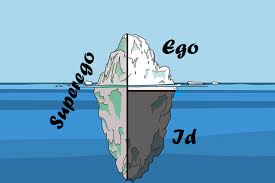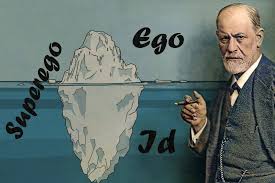
 In psychoanalytic theory, the id, ego and superego are three distinct, interacting agents in the psyche as defined by Sigmund Freud.
In psychoanalytic theory, the id, ego and superego are three distinct, interacting agents in the psyche as defined by Sigmund Freud.
In the ego psychology the id is the set of uncoordinated instinctual desires.
The superego plays a critical and moral role.
The ego is the organized, realistic mode that mediates between the instinctual desires of the id and the critical superego.
The ego transforms the id’s will into action.
The ego develops as a rational part of the personality that mediates between the desires of the id and the realities of the external world.
It operates on the reality principle, meaning it takes into account social norms and expectations to find realistic ways to satisfy the id’s demands.
The ego helps to make decisions and solve problems in a socially acceptable manner.
The id is conceived by Freud as the unconscious source of bodily needs and wants.
The id is the most primitive part of the personality.
It operates on the pleasure principle, which means it seeks immediate gratification of desires and needs.
The id is impulsive and does not consider the consequences of actions:representing basic instinctual drives such as hunger, thirst, and sex.
The id’s emotional impulses and desires include aggression and sexual drive.
The id acts based on the pleasure principle—immediate gratification of impulse and. desire.
Id is the dark, inaccessible part of our personality.
Id’s analysis is limited to dreams and neurotic symptoms, and is described in terms of contrast with the ego
The id has no organization and no collective will.
The id is concerned only with satisfaction of drives based on the pleasure principle.
The id is oblivious to reason.
Nothing in the id which corresponds to the idea of time.
The id knows no judgements of value, no good and evil, no morality.
Id’s Instinctual cathexes seeks discharge.
The id precedes the ego, and consists of the basic instinctual drives that are present at birth, and is governed only by the pleasure principle.
The id is the great reservoir of libido, the energy of desire, usually conceived as sexual in nature, and its life instincts that are constantly seeking a renewal of life.
The id also has a death instinct of destruction directed against the external world and others, expressed through aggression.
The ego acts according to the principles of reality.
The id’s drives are frequently incompatible with social reality, while the ego directs its energy to satisfy its demands in accordance with the imperatives of that reality.
The ego’s role as mediator between the id and reality, is often cloaks the unconscious commands of the id with its own preconscious rationalizations.
Freud used the word ego to mean the sense of self, and expanded it to include psychic functions such as judgment, tolerance, reality testing, control, planning, defense, synthesis of information, intellectual functioning, and memory.
The ego reason and common sense, in contrast to the id, which contains the passions.
The ego is fighting against the much stronger id.
The ego is required to serve 3 masters: the external world, the superego and the id.
The ego seeks to find a balance between the primitive drives of the id, the limitations imposed by reality, and the strictures of the superego.
The ego Is concerned with self-preservation, striving to keep the id’s desires within limits, adapted to reality and submissive to the superego.
THE EGO IS driven by the id, confined by the superego, repulsed by reality.
THE ego is in a struggle to bring about harmony among the competing forces.
The ego is subject to anxiety regarding the external world, moral anxiety regarding the superego, and neurotic anxiety regarding the strength of the passions in the id.
The ego may wish to serve the id, but the superego is constantly monitoring ego’s moves and punishes it with feelings of guilt, anxiety, and inferiority.
As a result the ego employs defense mechanisms that reduce the tension and anxiety by disguising or transforming the impulses that are perceived as threatening.
Denial, displacement, intellectualization, fantasy, compensation, projection, rationalization, reaction formation, regression, repression, and sublimation are the defense mechanisms.
The ego is depicted as being half in the conscious, a quarter in the preconscious, and the other quarter in the unconscious.
The superego reflects the internalization of cultural rules, absorbed from parents, other authority figures, and the general cultural ethos.
The superego performs the task of seeing that narcissistic satisfaction from the ego ideal is ensured in our conscience.
The superego is the moral component of the personality.
It represents the internalized ideals, values, and rules of society, often learned from parents and cultural influences.
The superego strives for perfection and judges our actions, leading to feelings of pride or guilt.
It functions to control the id’s impulses, ensuring that behaviors align with moral standards.
The superego can be described as the identification with the parental agency, and as development proceeds it also absorbs the influence of those who replace parents — educators, teachers, people chosen models.
A child’s super-ego is in fact constructed on the model of its parents’ super-ego:the vehicle of tradition and of all the time-resisting judgments of value which have propagated themselves in this manner from generation to generation.
The superego aims for perfection, and is part of the personality structure, mainly but not entirely unconscious.
The superego includes the individual’s ego ideals, spiritual goals, and the psychic agency, commonly called conscience: it criticizes and prohibits the expression of drives, fantasies, feelings, and actions.
The superego works in contradiction to the id, and operates to confine the ego to socially acceptable behavior, whereas the id merely seeks instant self-gratification.
According to Freud the superego and the ego are the product of two key factors: the state of helplessness of the child and the Oedipus complex.
The id is about desire and instinct, the ego is about reality and rationality, and the superego is about morality and ethics.
